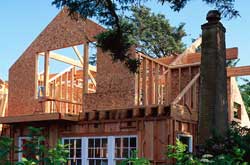The Home with No Energy Bills
See if We Have Top-Rated
Green Builders in Your Area

If rising energy prices make you wonder if you'll have to tighten your budget and eat out less, then you need to see this home. Built as a model of energy efficiency, this home building process was anything but normal. Equipped with energy saving windows, bamboo counters, and of course solar power, this home uses zero energy. Yours can too, read to find out how.
The Solar Home
This house is the product of Colorado University's 2005 Solar Decathlon entry. The Solar Decathlon is an intercollegiate competition held every few years where teams are judged on 10 performance tests. While the competition as a whole is geared toward solar energy, CU's 2005 effort focused on energy efficiency first.
Jeff Lyng, Project Manager for CU's Solar Decathlon House, revealed in an interview with HomeAdvisor, an online service that matches homeowners and contractors, that "energy efficiency is far more cost effective than renewable energy." As a result, the CU team built their home to make sense to the public rather than have a zero net-energy home that ran on sunflower seeds, which would have been fantastic but not very practical.
While the CU team focused on energy efficiency and bringing this knowledge to the public, they knew they needed to make this home approachable. There were standards they had to comply with as part of the competition, but they didn't want to end up with a museum. They were building a home, one where people could cook, sleep, and of course save energy.
Natural Materials
Another main objective for this home was to use as many bio-based or natural materials as they could. They used a product called "ply-boo", which is a fusion of plywood and bamboo, for the counters. They also used pressed soy beans for the window sills, and Lyng explains "this is a house you can sink your teeth into."
Funny as that might be, many natural materials are a real turn off to many homeowners, with the exception of marble, granite, and other natural stones. However, what we can glean is that hybrids or composite materials such as composite decking and composite roofing systems may cost less over time because they last longer, require little maintenance, all while protecting the environment.
Design
Lyng admits that the home is, at heart, a mobile home and was not winning any awards based on its exterior appearance. However, the inside is pretty sharp: one bedroom and one bathroom with quite a bit of living space, all with the sleek look of modern design.
Although the design of the home was a directive, their real target was building a home that produced more energy—in fact twice as much—as it used. "When this home is connected to the grid, it will be capable of running the meter backwards and restoring power to the grid thereby reimbursing the homeowner for their excess energy production." That's pretty cool. If it were only this easy with residential homes.
What This Means for Homeowners
We can steal from the CU Solar Decathlon House. Not the TV or the DVD player (though maybe those sharp stools in kitchen), but we can steal their ideas for our homes and reduce our energy bills for a long time into the future.
Great Ways to Save at Home
Appliances
"If you're not using Energy Star appliances, you're not even trying," Lyng says. This is the smartest move a homeowner can make to reduce energy bills and quite an easy one if you already need to replace a clothes washer, a dishwasher, water heater, or furnace, especially considering more than 40% of a home's energy is used just to heat water. Many communities even offer rebates for buying certain energy-rated models.
Energy Efficient Lighting
These bulbs are more expensive up front than the typical light bulb, but they use less energy and can last as much as 7-10 times longer than standard bulbs. Replacing the bulbs in your home is a quick, cheap solution that will pay for itself in a year.
Windows & Insulation
Older windows or improperly installed windows allow expensive heat to escape and force your furnace to work overtime trying to warm your home. So these windows can not only lower energy bills, but they can also extend the life of your furnace.
Upgrade your insulation in whatever way that you can. Attic insulation is most important since heat rises and will escape into unused parts of your home if not properly insulated. Blown-in-insulation is great to add more protection to your walls.
These are the best things we can learn from this picture of health decathlete. These ideas not only improve the value of a home, but they also give you back more than you spent. And that's just what smart homeowners are always looking for.
More Tips & Advice For Your Home
- Related Articles
- Recent Articles

